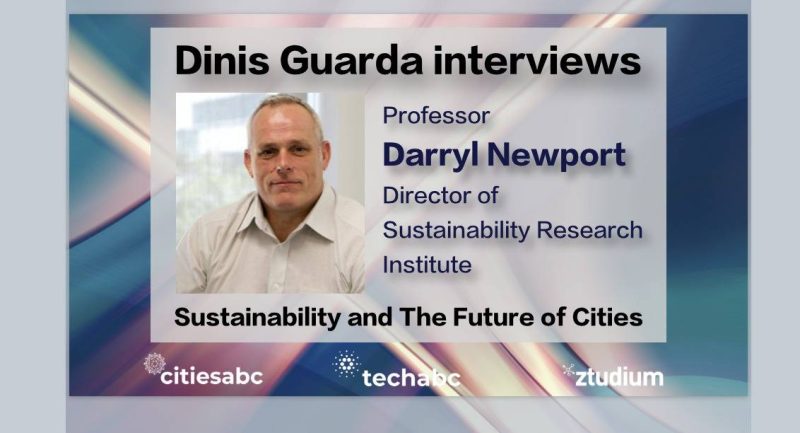Interview With Prof Darryl Newport, Director of Sustainability Research Institute (SRI) - Green Economy And The Future of Cities

Categories :
From his role as Director of Sustainability Research Institute (SRI) at University of East London, Professor Darryl Newport is an experienced academic whose main areas of focus are sustainable materials, circular economy, green economy and everything in between. In this new series interview for citiesabc, host Dinis Guarda and Prof. Darryl Newport go through major economic challenges, including those affecting city development and COVID-19. And he provides sustainable solutions for all of them.
Interview Structure
· Profile and education background
· Academic career
· About The Sustainable Research Institute and the University of East London
· Green economy. Challenges and opportunities
· Cities and smart city projects
· Green infrastructure
· Sustainability and circular economy solutions
· Case studies and research projects
· A look into the future
Key Takeaways
- About the relationship between academia, governments and business towards the green economy. “Governments are more conscious about the need of boosting circular economy, sustainability and the green economy overall. EU and UK programs are quite holistic today and they try to bring together local and national governments and the industry. One really important focus now is also bringing on board SMEs and startups as they are now important drivers of innovation.”
- About circular economy. “If you want to build something the legacy procedure has always been a linear economy. You outsource raw materials, turn them into resources, build something and then it goes to waste. A circular economy approach is to change this idea and turn it around a new paradigm where waste is no longer part of the chain. That involves a cultural approach to our relationship with the economy and consumerism. As such, circular economy is about reusing and repurposing materials of all types: from food to building materials. It is to change the linear process and change our mindset along the way.”
- About green infrastructure and examples. “Green infrastructure is a catch-all term to describe the network of natural and semi-natural features within and between our villages, towns and cities. These features range in scale, from street trees, green roofs and private gardens through to parks, rivers and woodlands. I worked as an adviser when London was getting ready for the Olympics in 2012. I also work closely in the construction industry. My role is to give guidance about better materials and sustainable and positive solutions.
This involves developing new solutions from waste materials and finding new sustainable materials for construction and reducing the carbon footprint along the way.”
- About current projects in Africa and Asia. “We are now involved in the development of infrastructure in different parts of the world. We work in things as basic and important as building roads and other community based projects using reused materials and local resources. Currently, we are working in countries like Zambia or Sierra Leona among others.
In the past, we have worked in China too. In this regard, China is a very concerned country because they have a real problem with wastage and pollution. They have megacities there and that means megawaste. Our projects in China involved finding solutions in sewer systems from a sustainable approach.”
Professor Darryl Newport Biography
Professor Darryl Newport is Director of the Sustainability Research Institute (SRI) and leader on a number of key research projects. During this current tenure I have united a number of research centres under the SRI Umbrella, including the Manufactured Aggregate Research Centre (MARC), Environmental Research Group and the Resource Efficiency Research Centre. I currently manage research staff with research interests aligned to SRI research ethos. The SRI currently supervises a number of PhD students. Darryl currently is Director of Studies for three students and sits on two additional supervisory teams.
Darryl's research focuses on sustainable use of materials, resource efficiency and the circular economy. These areas of research are particularly important for the development of our future cities and provide considerable opportunity for innovative material and process development.
In the recent Research Excellence Framework (REF 2014), the SRI in partnership with UEL’s Architecture research team, submitted to UoA 16. This was a successful partnership and a very creditable showing for our first submission.
Academic Qualifications
- BSc (Hons) Survey and Mapping Science 2.1 (1993) University Of East London
Professional Qualifications
- Prince2 (2006) University of East London
- FRSA (2013) The Royal Society for the Encouragement of Arts, Manufactures and Commerce
Professor Darryl Newport Biography: https://www.uel.ac.uk/staff/n/darryl-newport
LinkedIn: https://www.linkedin.com/in/darrylnewport/
ResearchGate Profile: https://www.researchgate.net/profile/Darryl_Newport
More Interviews
- Video Interview with Dr Jamal Ouenniche, Professor & Chair in Business Analytics, University of Edinburgh - Business Analytics, AI Data Road Maps
- Video Interview with Michael Terpin, Founder and CEO of Transform Group, BitAngels - Legendary Blockchain Investor And Crypto Investor Influencer

Hernaldo Turrillo is a writer and author specialised in innovation, AI, DLT, SMEs, trading, investing and new trends in technology and business. He has been working for ztudium group since 2017. He is the editor of openbusinesscouncil.org, tradersdna.com, hedgethink.com, and writes regularly for intelligenthq.com, socialmediacouncil.eu. Hernaldo was born in Spain and finally settled in London, United Kingdom, after a few years of personal growth. Hernaldo finished his Journalism bachelor degree in the University of Seville, Spain, and began working as reporter in the newspaper, Europa Sur, writing about Politics and Society. He also worked as community manager and marketing advisor in Los Barrios, Spain. Innovation, technology, politics and economy are his main interests, with special focus on new trends and ethical projects. He enjoys finding himself getting lost in words, explaining what he understands from the world and helping others. Besides a journalist, he is also a thinker and proactive in digital transformation strategies. Knowledge and ideas have no limits.








